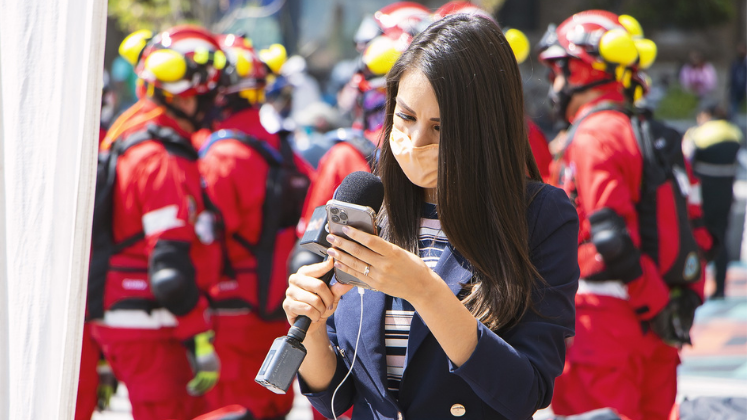
The Global Science Journalism Report 2021, published by SciDev.Net/CABI and co-authored by experts at LSE, reveals that 64% of respondents surveyed said that the number of projects they work on in one week has grown in the past five years. This percentage is slightly higher in Africa and Europe.
The survey, which included responses from science journalists across 77 countries taken between February and May 2021, found that, generally, science journalists work on one story, item or package over a two-week period. However, women typically worked on five items over the same period.
Despite this, 46% of all respondents reported feeling happy in their jobs, and 81% believed they will ‘certainly or probably’ still be working in the field in the next five years. Female professionals reported that they would recommend the career to a young student, the study reveals.
The report also suggests that those in the profession do not agree that science journalism is a ‘dying profession’, with 73% disagreeing with this statement and 33% rejecting the idea that ‘science journalism is in crisis’.
Report author Dr Luisa Massarani said:
“This report gives an insightful snapshot of the current working conditions, values and aspirations of some of the world’s leading science journalists and, as such, is a valuable study in how organisations such as SciDev.Net can better understand and support them as they go about their task of reporting science in the media.
“It is interesting, in particular, to learn that despite the workload of science journalists becoming more intense and less than half overall reporting that they are happy with their jobs, the vast majority still see themselves staying in their occupations for the foreseeable future.”
Respondents were also asked about the impact that the COVID-19 pandemic had had on their work. For 48% of the respondents, scientists were more easily available to talk to during the COVID-19 pandemic in comparison to previous years and 37% found that scientists were more open and talkative than before the pandemic.
While peer-reviewed scientific articles, scientists and official institutions remained the most reliable sources of information, more than half of journalists (55%) admitted to using pre-print research articles in their COVID-19 stories, and 59% said they had adopted different procedures when covering pre-print research articles.
Social media was reported to be useful for 97% of respondents with Facebook being the platform that journalists reported to be most engaged with.
The findings of the report also revealed some of the other concerns faced within the profession. For example, many science journalists agree that there is too much focus on the results of scientific research, with too few people reporting on the process of science. While many agreed that there was a correlation between interest in science and science journalism, many felt that there was a risk to the quality of reporting as a result of budget cuts in newsrooms and increases in press releases from journals, universities and researchers.
Professor Martin W. Bauer (LSE), who co-designed the study, highlighted:
"Science journalism is under severe pressures on a global scale, including changes in the economics of journalism, social media and the increasing push from PR in research-based institutions. The SciDev.Net report provides, for the second time, useful evidence for the profession to secure quality science reportage in changing circumstances."
The survey is a follow-up to the Global Science Journalism Report 2013 which published answers from professionals in several rounds, starting with participants of the World Conference of Science Journalists 2009 in London, Latin American networks, through to the first SciDev.Net round.
Access the report
The Global Science Journalism Report 2021 is available to read on the SciDev.Net website here.
About SciDev.Net
SciDev.Net is the world’s leading source of reliable and authoritative news, views and analysis on information about science and technology for global development.
Image courtesy of Pixabay.